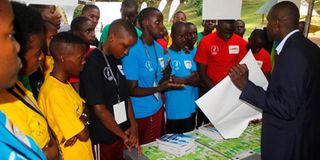NADO steps up war against drugs in Ugandan sports

Dr Zavuga sensitises youngsters about sports and drugs during the UOC Olympic Values Youth Camp at Kisubi Beach last month. PHOTO BY ISMAIL KEZAALA
What you need to know:
Doping. National Anti-doping Organisation (NADO) sensitizes athletes on the dangers of using banned drugs.
Kampala. The biggest sports story in the build-up to next month’s Olympics has been the doping scandals in Russia and Kenya.
The two countries, giants in track and field, have ruined the image of the sport with Russia paying a heavy price as they will not field a complete team in Rio de Janeiro. While Uganda cannot be considered a sports heavyweight, its image has remained intact. Yet, some of Uganda’s top athletes live and train in Kenya where doping has proved to be widespread.
“It takes discipline to avoid getting involved in using performance-enhancing drugs,” Uganda’s star runner Moses Kipsiro reasons. “But it also hurts to be competing against opponents that use drugs.” Kipsiro and other elite runners like Stephen Kiprotich are often tested during international competitions.
Kipsiro had his worst experience with drug testers during the 2010 Commonwealth Games in New Delhi, India where he won 5,000m and 10,000m gold medals. Shortly after he had completed his double victory, he was asked to provide a urine sample.
But because it was too humid and his body drained after running for over 27 minutes, Kipsiro could not summon a drop of urine. He was given fluids to drink and asked to jog for more laps in order to get the required sample.
It took him over three hours to get the sample with his tired colleagues waiting in the team bus.
“Those are the troubles we go through. But it is a duty you must perform as an international athlete,” says Kipsiro.
While the elite sportsmen cannot avoid being tested, their locally-based counterparts haven’t been subjected to such screening until recently.
For about two years now, the National Anti-doping Organisation (NADO) has been on a drive to clean Ugandan sports. Headed by Dr Robert Zavuga, NADO has been traversing the country sensitising sports communities about the dangers of using drugs to enhance performance.
With support from the World Anti-doping Agency (WADA) and Uganda Olympic Committee (UOC), NADO has been present at many big national competitions, preaching the gospel of clean sport.
“Because we didn’t want to catch people unawares, we started by teaching sportsmen what to do and what not to do,” Dr Zavuga revealed. Zavuga and his team visited the country’s top sporting schools and training camps to tap into teenage athletes. “During the Scouts Jamboore at Kaazi in August last year, we interacted with over 5,000 young sportsmen and it showed that most of them didn’t have an idea about drugs in sports,” noted Zavuga. “During the World Day for Physical Activity on May 9th, we sensitised hundreds of police officers and now we have many that know how to handle cases of doping.”
Early this year, Zavuga’s efforts were rewarded as he was named the team doctor for Uganda’s Olympics team. After his appointment, he set out to ensure Uganda is represented by a clean team at the Games getting underway August 5 in Rio de Janeiro, Brazil. In April, NADO announced commencement of tests on elite sportsmen before they travelled to represent Uganda in other countries. “While we are aware that such top athletes are tested in foreign competitions, we also need to have their data,” noted Zavuga.
Last month, he revealed plans to test all footballers taking part in the Uganda Premier League and the lower tier Fufa Big League. There are reports that some local footballers and boxers use marijuana.
Before he travelled to Rio at the weekend, Zavuga organised a health camp for all Olympic-bound athletes where they were tested and cautioned about usage of performance-enhancing drugs.
“As top sportsmen, you are responsible for whatever goes into your body,” Zavuga told the team during the camp facilitated by the Aga Khan University Hospital, Naalya. “Don’t do self-medication because some human drugs contain banned substances. That means you must tell the doctor that you are a national athlete whenever you visit the hospital. Also avoid food supplements,” he added.
Mildred Gamba, one of the country’s leading female sprinters, however, questioned how Ugandan athletes will favourably compete with their foreign counterparts, who regularly use food supplements.
“I think what we need as country is a nutritionist to advise us on the kind of foods to eat. Every other international athlete I have seen out there uses food supplements,” argued Gamba. No prominent Ugandan sportsman has tested positive for drugs and Zavuga hopes Team Uganda returns with only negative results from Brazil.
New move
Zavuga announced that all players featuring in the Uganda Premier League next season will undergo mandatory drug tests.




